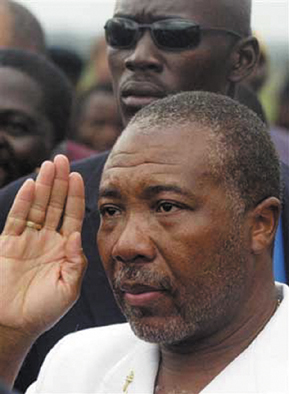LIBERIA'S former President Charles Taylor has announced his resolve again to boycott the resumption of his war crimes trial at The Hague, Netherlands. Taylor previously boycotted the trial's opening on June 4 claiming it would not be fair because he had a single defence lawyer. According to the British Broadcasting Corporation (BBC), an official of the court, Vincent Nmehielle said Taylor had called him to say he would not attend the court. It was however not clear whether he provided an official reason. Taylor is accused of backing rebels in Sierra Leone in an 11-year campaign that killed thousands of civilians. He has however denied all the charges. His is the first case of its kind against an African former leader. "He (Taylor) said the chamber knows why he will not be in court," said Nmehielle, who is responsible for the rights of the accused. But presiding judge Julia Sebutinde, denied any knowledge of this saying: "For the record, the chamber does not know. We have not officially been informed why Mr. Taylor is not in court." At the trial opening, Taylor explained the reasons for his boycott in a letter read to the judges by his lawyer, Karim Khan. The letter said Taylor would "not receive a fair trial" at the court that was not "fit for purpose", adding that he would not appear until "adequate time and facilities are provided". Khan then left the court, saying he was not in a position to represent his client without further instruction from him. Judge Sebutinde ordered the trial to continue without Taylor, and the prosecution delivered its opening statements. Taylor has been indicted on 11 charges of war crimes, crimes against humanity and violations of international humanitarian law over his alleged role in the brutal civil war in Sierra Leone. The charges include terrorising the civilian population, murder, sexual violence, physical violence, using child soldiers, enslavement and looting. Taylor pleaded not guilty to all the charges at his first appearance at the court in Freetown, Sierra Leone, in March 2006. The Special Court for Sierra Leone has been approved by both the United Nation and the government of Sierra Leone.
It is sitting in the facilities of the International Criminal Court (ICC) in The Hague because of the risks that the trial might lead to renewed tensions within Sierra Leone and Liberia. BBC Africa analyst David Bamford says the trial hinges on determining the degree to which Taylor helped start, prolonged and deepened the war in Sierra Leone. Taylor was said to have started Liberia's civil war in 1989 and became one of a number of warlords competing for control in the country. He later emerged as Liberia's most powerful politician and won the 1997 presidential election. Meanwhile, in 1991, one of Taylor's comrades-in-arms, Foday Sankoh, started his own rebellion in neighbouring Sierra Leone. The prosecution claims Taylor provided the Revolutionary United Front (RUF) leader with training, money, fighters, arms and ammunition to start the rebellion. The RUF became notorious for hacking off the hands and legs of civilians during their decade-long war. It is alleged that Taylor shared a common plan with the RUF's commanders to gain power and control over Sierra Leone, so he could gain access to its diamonds and have a government in Freetown that would support his aims. Taylor however lost power in 2003 after rival militias rose up and forced him into exile in Nigeria. He was deported by Nigeria last year in controversial circumstances and flown to The Hague to await his trial. |
|---|
